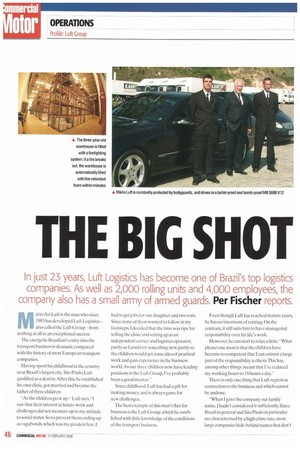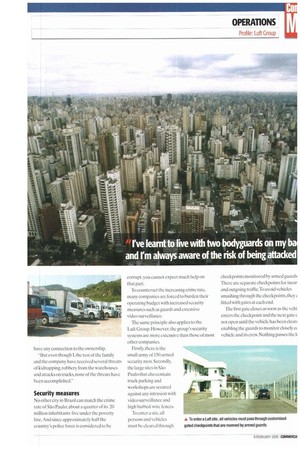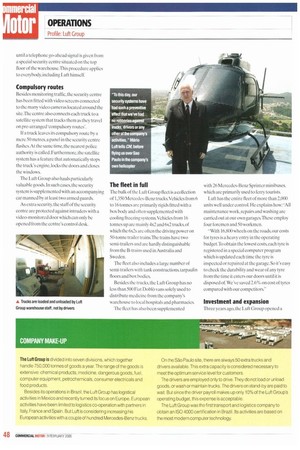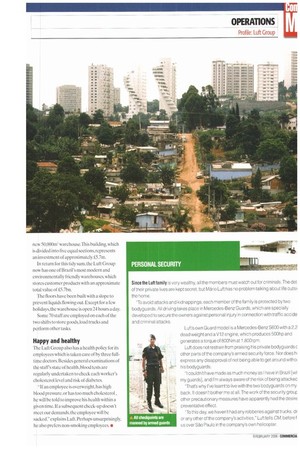THE BIG SHOT
Page 46

Page 47

Page 48

Page 49

If you've noticed an error in this article please click here to report it so we can fix it.
In just 23 years, Luft Logistics has become one of Brazil's top logistics companies. As well as 2,000 rolling units and 4,000 employees, the company also has a small army of armed guards. Per Fischer reports.
MArlo An Luft is the man who since 1983 has developed Luft Logistics— also called the Luft Group— from nothing at all to an exceptional success.
The energetic Brazilian's entry into the transport business is dramatic compared with the history of most European transport companies.
Having spent his childhood in the country near Brazil's largest city. Sao Paulo, Luft qualified as a dentist. After this. he established his own clinic. got married and became the father of three children.
"As the children grew up," Luft says,"I saw that their interest in future work and challenges did not measure up to my attitude to social status. So to prevent them ending up as vagabonds, which was my greatest fear. I had to get jobs for our daughter and two sons. Since none of them wanted to follow in my footsteps,I decided that the time was ripe for selling the clinic and setting up as an independent carrier and logistics operator; partly so I could try something new, partly so the children would get some idea of practical work and gain experience in the business world.As our three children now have leading positions in the Luft Group, I've probably been a good mentor."
Since childhood, Luft has had a gift for making money,and is always game for new challenges.
The best example of this man's flair for business is the Lull Group ,which he established with little knowledge of the conditions of the transport business. Even though Luft has reached mature years, he has no intentions of retiring. On the contrary, it still suits him to have managerial responsibility over his life's work.
However, he can start to relax a little:"What pleases me most is that the children have become so competent that I can entrust a large part of the responsibility to them:This has, among other things.meant that I've reduced my working hours to 18 hours a day."
There is only one thing that Luft regrets in connection to the business and which cannot he undone.
"When I gave the company our family name.! hadn't considered it sufficiently. Since Brazil in general and Sao Paulo in particular are characterised by a high crime rate, most large companies hide behind names that don't have any connection to the ownership.
"But even though I. the rest of the family and the company have received several threats of kidnapping, robbery from the warehouses and attacks on trucks, none of the threats have been accomplished."'
Security measures No other city in Brazil can match the crime rate of Sao Paulo; about a quarter of its 20 million inhabitants live under the poverty line. And since approximately half the country's police force is considered to be
corrupt. you cannot expect much help on that part.
1:0 counteract the increasing crime rate, many companies are forced to burden their operating budget with increased security measures such as guards and extensive video surveillance.
The same principle also applies to the Luft Group. However, the group's security systems are more extensive than those of most other companies.
Firstly there is the small army o!150 armed security men. Secondly. the large sites in Sao Paulo that also contain truck parking and workshops are secured against any intrusion with video surveillance and high barbed-wire fences.
To enter a site.al I persons and vehicles must he cleared throuuh checkpoints monitored by armed guards There are separate checkpoints for incor and outgoing traffic.To avoid vehicles smashing through the checkpoints, they t fitted with gates at each end.
The first gate closes as soon as the vehi enters the checkpoint and the next gate c not open until the vehicle has been clean enabling the guards to monitor closely et vehicle and its crew. Nothing passes the Ii
until a telephone go-ahead signal is given from a special security centre situated on the top floor of the warehouse.This procedure applies to everybody, including I.uft himself.
Compulsory routes
Besides monitoring traffic, the security centre has been fitted with video screens connected to the many video cameras located around the site.'fhe centre also connects each truck to a satellite system that tracks them as they travel on pre-arranged 'compulsory routes'.
If a truck leaves its compulsory route by a mere 50 metres. a panel in the security centre flashes. At the same time, the nearest police authority is called. Furthermore, the satellite system has a feature that automatically stops the truck's engine, locks the doors and closes the windows.
The Luft Group also hauls particularly valuable goods In such cases, the security system is supplemented with an accompanying car manned by at least two armed guards.
As extra security, the staff of the security centre are protected against intruders with a video-monitored door which can only be opened from the centre's control desk.
The fleet in full
The bulk of the Luft Group fleet is a collection of 1.350 Mercedes-Benz trucks. Vehicles from 6 to 16 tonnes are primarily rigids fitted with a box body and often supplemented with cooling/freezing systems. Vehicles from 16 tonnes up are mainly 4x2 and 6x2 trucks, of which the 6x2s are often the driving power on 50-tonne trailer trains.The trains have two semi-trailers and are hardly distinguishable from the B-trains used in Australia and Sweden.
The fleet also includes a large number of semi-trailers with tank constructions, tarpaulin floors and box bodies Besides the trucks, the Luft Group has no less than 500 Fiat Doblo vans solely used to distribute medicine from the company's warehouse to local hospitals and pharmacies.
The fleet has also been supplemented with 26 Mercedes-Benz Sprinter minibuses, which are primarily used to ferry tourists.
Luft has the entire fleet of more than 2,000 units well under control. He explains how:"All maintenance work, repairs and washing are carried out at our own garages.These employ four foremen and 50 workmen.
"With 16,800 wheels on the roads, our costs for tyres is a heavy entry in the operating budget. To obtain the lowest costs,each tyre is registered in a special computer program which is updated each time the tyre is inspected or repaired at the garage. So it's easy to check the durability and wear of any tyre from the time it enters our doors until it is disposed of. We've saved 2.6% oncost of tyres compared with our competitors.
Investment and expansion
Three years ago, the Luft Group opened a new 50,000m2warehouse.This building, which is divided into five equal sections, represents an investment of approximately E5.7m.
In return for this tidy sum, the Luft Group now has one of Brazil's most modern and environmentally friendly warehouses, which stores customer products with an approximate total value of f5.7bn.
The floors have been built with a slope to prevent liquids flowing out. Except for a few holidays, the warehouse is open 24 hours a day.
Some 70 staff are employed on each of the Iwo shifts to store goods, load trucks and itc r form other tasks.
Happy and healthy The Lull Group also has a health policy for its employees which is taken care of by three fulltime doctors. Besides general examinations of the staffs state of health,blooc.1 tests are regularly undertaken to cheek each worker's cholesterol level and risk of diabetes.
"If an employee is overweight, has high blood pressure. or has too much cholesterol. he will be told to improve his health within a given time. If a subsequent check-up doesn't meet our demands, the employee will be sacked." explains Luft. Perhaps unsurprisingly, he also prefers non-smoking employees. •






































































































































































































